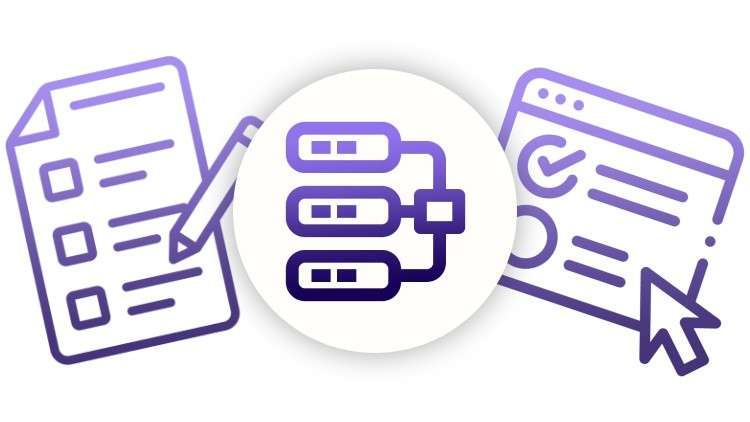![Data Structures MCQ [2023]](https://studybullet.com/wp-content/uploads/2023/11/5673802_a015_2.jpg)
550+ Knowledge Buildings Interview Questions and Solutions MCQ Apply Check Quiz with Detailed Explanations. [Updated 2023]
What you’ll study
In-Depth Understanding of Knowledge Buildings
Mastery of Basic Algorithms
Proficiency in Analyzing Algorithm Effectivity
Sensible Downside-Fixing Expertise
Preparation for Technical Interviews and Exams:
Capability to Apply Theoretical Ideas in Actual-World Conditions
Description
550+ Knowledge Buildings Interview Questions and Solutions MCQ Apply Check Quiz with Detailed Explanations. [Updated 2023]
Embark on a journey to grasp the intricacies of Knowledge Buildings and Algorithms with our meticulously crafted MCQ Apply Course. Designed for each learners and seasoned programmers, this course is an important software for anybody aspiring to strengthen their coding abilities, put together for aggressive exams, or excel in technical interviews.
What You’ll Study:
- Fundamentals of Knowledge Buildings: Delve into the elemental ideas, together with the definitions, classifications, and variations between primitive and summary knowledge buildings. Improve your understanding of primary operations like insertion, deletion, and traversal.
- Linear Knowledge Buildings: Achieve in-depth information of Arrays, Linked Lists, Stacks, and Queues. Discover their varieties, operations, and real-world functions. Study dynamic and multi-dimensional arrays, and perceive the nuances of singly, doubly, and round linked lists.
- Non-Linear Knowledge Buildings: Unravel the complexities of Bushes and Graphs. Uncover varied tree buildings resembling Binary Bushes, AVL Bushes, and B-Bushes, and delve into graph principle overlaying directed, undirected, and weighted graphs.
- Hashing and Maps: Perceive hashing ideas, hash features, and collision decision methods. Study concerning the implementation of maps and dictionaries.
- Sorting and Looking Algorithms: Grasp a variety of sorting algorithms together with Bubble Kind, Merge Kind, and Fast Kind, in addition to looking out strategies like Binary Search and Hash-based Search.
- Algorithm Evaluation and Design: Grasp the necessities of algorithm effectivity with Time and Area Complexity Evaluation. Familiarize your self with Huge-O, Huge-Θ, and Huge-Ω notations, and discover algorithmic methods like Divide and Conquer, Grasping Strategies, and Dynamic Programming.
Course Format (Quiz):
Dive right into a dynamic and interactive studying expertise with our MCQ-based course format. Tailor-made to offer a complete understanding of Knowledge Buildings and Algorithms, this course focuses on lively engagement and sensible software. Whether or not you’re a newbie or a sophisticated learner, our quiz format is designed to cater to all ranges.
We Replace Questions Recurrently:
- Keep Up-to-Date: Our course content material is recurrently up to date to replicate the newest tendencies and developments within the discipline of laptop science. This ensures that you’re at all times studying essentially the most present and related info.
- Ever-Evolving Query Financial institution: We frequently increase and refine our query financial institution to incorporate new challenges, preserving the course recent and interesting.
- Attentive to Suggestions: We hearken to our college students! Primarily based in your suggestions, we make changes to boost the educational expertise frequently.
Examples of the Forms of Questions You’ll Encounter:
- Situation-based issues that problem you to use your information in sensible conditions.
- Conceptual questions to check your understanding of basic rules.
- Code snippets for evaluation, serving to you perceive and debug algorithm implementations.
- Comparative questions that assess your potential to tell apart between totally different knowledge buildings and algorithms.
- Downside-solving questions that require important pondering and software of a number of ideas.
Continuously Requested Questions (FAQs):
- What’s the distinction between a stack and a queue?
- Reply: A stack is a LIFO (Final In, First Out) construction, whereas a queue is a FIFO (First In, First Out) construction.
- How does a binary search algorithm differ from a linear search?
- Reply: Binary search is extra environment friendly, dividing the search interval in half every time, however requires a sorted array. Linear search doesn’t require sorting however is much less environment friendly, checking every aspect sequentially.
- What’s a hash collision and the way can it’s dealt with?
- Reply: A hash collision happens when two keys hash to the identical index. It may be dealt with by strategies like chaining or open addressing.
- Why is Huge-O notation essential in algorithms?
- Reply: Huge-O notation helps in understanding the effectivity of an algorithm by way of time or area complexity, particularly for giant enter sizes.
- What are dynamic arrays and the way are they totally different from static arrays?
- Reply: Dynamic arrays can resize throughout runtime, not like static arrays with fastened sizes.
- Are you able to clarify recursion with an instance?
- Reply: Recursion includes a perform calling itself. A traditional instance is calculating factorials.
- What’s a binary tree?
- Reply: A binary tree is a tree knowledge construction the place every node has at most two youngsters.
- How do graph algorithms differ from tree algorithms?
- Reply: Graph algorithms take care of extra complicated buildings than bushes, usually involving cycles and varied forms of connections.
- What’s a trie used for?
- Reply: A trie is a tree-like knowledge construction used for environment friendly retrieval of keys in a dataset of strings.
- Why is Merge Kind most well-liked over Fast Kind in some circumstances?
- Reply: Merge Kind ensures a time complexity of O(n log n) and is steady, making it most well-liked in situations the place stability and predictable efficiency are essential.
Be a part of our course to discover these ideas and extra by means of participating, thought-provoking quizzes designed to raise your understanding of information buildings and algorithms!
Enroll in our “Grasp Knowledge Buildings & Algorithms: The Final MCQ Apply Course” at this time and take step one in the direction of mastering these essential laptop science fundamentals!
Content material
Discovered It Free? Share It Quick!
The submit Knowledge Buildings Interview Questions Apply Check MCQ appeared first on destinforeverything.com/cms.
Please Wait 10 Sec After Clicking the "Enroll For Free" button.








